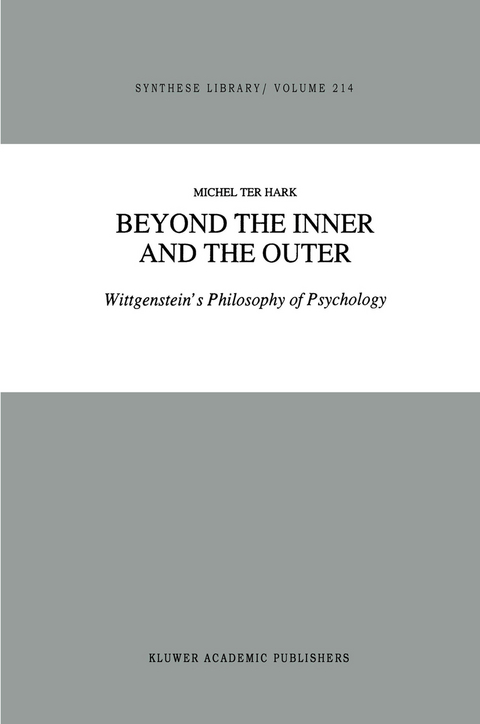
Beyond the Inner and the Outer
Springer (Verlag)
978-0-7923-0850-8 (ISBN)
Wittgenstein's aphoristic style holds great charm, but also a great danger: the reader is apt to glean too much from a single fragment and too little from the fragments as a whole. In my first confron tations with the Philosophical Investigations I was such a reader, and so, it turned out, were most of the writers on Wittgenstein's later philosophy. Wittgenstein's remarkable ability to bring together many facets of his thought in one fragment is fully exploited in the critical literature; but hardly any attention is paid to the connection with other fragments, let alone to the many hitherto unpublished manuscripts of which the Philosophical Investigations is the final product. The result of this fragmentary and ahistorical approach to Wittgenstein's later work is a host of contradictory interpretations. What Wittgenstein really wanted to say remains insufficiently clear. Opinions are also strongly divided about the value of his work. Some authors have been encouraged by his aphorisms and rhetorical questions to dismiss the whole Cartesian tradition or to halt new movements in linguistics or psychology; others, exasperated, reject his philo sophy as anti-scientific conceptual conservatism. After consulting unpublished notebooks and manuscripts which Wittgenstein wrote between 1929 and 1951, I became a very different reader. Wittgenstein turned out to be a kind of Leonardo da Vinci, who pursued a form from which every sign of chisel ling, every attempt at improvement, had been effaced.
1. On the Origin of the Philosophical Investigations.- 2. Language-Games as Context of Meaning.- 1. The psychological theory of meaning.- 2. Horizontal and vertical language-games.- 3. Agreement in Forms of Life.- 1. Internal relations.- 2. Justifications without end, end without justification...- 3. Forms of life and constitutive rules.- 4. My Mind: First Person Statements.- 1. Robinson Crusoe and private language.- 2. Four misleading analogies.- 3. Description of one’s inner.- 5. Other Minds: Third Person Statements.- 1. The asymmetry of observation and expression.- 2. The hidden inner.- 3. ‘Einstellung zur Seele’.- 4. ‘Menschenkenntnis’ and indeterminacy.- 6. The Meaning of Aspects.- 1. ‘Meaning-theory’ versus ‘Gestalt-theory’.- 2. Seeing-as and organization.- 3. Seeing-as and interpretation.- 4. Seeing and thinking.- 5. Secondary meaning and aspect.- 7. The Grammar of Psychological Concepts.- 1. Sensations and impressions.- 2. Emotions.- 3. Images and fancies.- 4. Inner states’ and expecting.- 5. Feelings of tendency.- 6. Willing.- 8. Conclusion: Wittgenstein and the Turing Test.- Appendix of German Quotations.
| Erscheint lt. Verlag | 31.8.1990 |
|---|---|
| Reihe/Serie | Synthese Library ; 214 |
| Übersetzer | Anthony P. Runia |
| Zusatzinfo | XII, 340 p. |
| Verlagsort | Dordrecht |
| Sprache | englisch |
| Maße | 156 x 234 mm |
| Themenwelt | Geisteswissenschaften ► Philosophie ► Erkenntnistheorie / Wissenschaftstheorie |
| Geisteswissenschaften ► Philosophie ► Sprachphilosophie | |
| ISBN-10 | 0-7923-0850-6 / 0792308506 |
| ISBN-13 | 978-0-7923-0850-8 / 9780792308508 |
| Zustand | Neuware |
| Haben Sie eine Frage zum Produkt? |
aus dem Bereich

![Was heißt Denken?. Vorlesung Wintersemester 1951/52. [Was bedeutet das alles?] - Martin Heidegger](/media/113619842)
